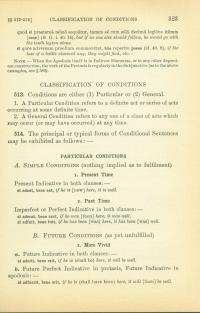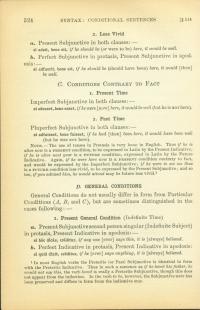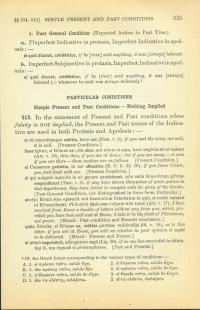513. Conditions are either (1) Particular or (2) General.
- A Particular Condition refers to a definite act or series of acts occurring at some definite time.
- A General Condition refers to any one of a class of acts which may occur (or may have occurred) at any time.
514. The principal or typical forms of Conditional Sentences may be exhibited as follows.
PARTICULAR CONDITIONS
A. SIMPLE CONDITIONS (nothing implied as to fulfillment)
- Present Time:
Present indicative in both clauses.
Sī adest, bene est.
If he is [now] here, it is well. - Past Time:
Imperfect or perfect indicative in both clauses.
Sī aderat, bene erat.
if he was [then] here, it was well.Sī adfuit, bene fuit.
If he has been [was] here, it has been [was] well.
B. FUTURE CONDITIONS (as yet unfulfilled)
- More Vivid:
a. Future indicative in both clauses.
Sī aderit, bene erit.
If he is (shall be) here, it will be well.b. Future perfect indicative in protasis, future indicative in apodosis.
Sī adfuerit, bene erit.
If he is (shall have been) here, it will [then] be well. - Less Vivid:
a. Present subjunctive in both clauses.
sī adsit, bene sit
If he should be (or were to be) here, it would be well.b. Perfect subjunctive in protasis, present subjunctive in apodosis.
Sī adfuerit, bene sit.
If he should be (should have been) here, it would [then] be well.
C. CONDITIONS CONTRARY TO FACT
- Present Time:
Imperfect subjunctive in both clauses.
Sī adesset, bene esset
If he were [now] here, it would be well.
(but he is NOT here) - Past Time:
Pluperfect subjunctive in both clauses.
sī adfuisset, bene fuisset
If he had [then] been here, it would have been well.
(but he was NOT here)
Note— The use of tenses in protasis is very loose in English. Thus if he is alive now is a PRESENT condition, to be expressed in Latin by the present indicative; if he is alive next year is a FUTURE condition, expressed in Latin by the future indicative. Again, if he were here now is a PRESENT Condition Contrary to Fact, and would be expressed by the imperfect subjunctive; if he were to see me thus is a FUTURE Condition Less Vivid, to be expressed by the present subjunctive; and so, if you advised him, he would attend may be Future Less Vivid.1
GENERAL CONDITIONS
D. General Conditions do not usually differ in form from Particular Conditions (A, B, and C), but are sometimes distinguished in the cases following.
- Present General Condition (Indefinite Time)
a. Present subjunctive 2nd person singular (indefinite subject) in protasis, present indicative in apodosis.
Sī hōc dīcās, crēditur.
If any one [ever] says this, it is [always] believed.b. Perfect indicative in protasis, present indicative in apodosis.
Sī quid dīxit, crēditur.
If he [ever] says anything, it is [always] believed. - Past General Condition (Repeated Action in Past Time)
a. Pluperfect indicative in protasis, imperfect indicative in apodosis.
Sī quid dīxerat, crēdēbātur.
If he [ever] said anything, it was [always] believed.b. Imperfect subjunctive in protasis, imperfect indicative in apodosis.
Sī quid dīceret, crēdēbātur.
If he [ever] said anything, it was [always] believed.
(= whatever he said was always believed)2
Footnotes
2. Cf. the Greek forms corresponding to the various types of conditions.
| A. 1. εἰ πράσσει τοῦτο, καλῶς ἔχει. | 2. εἰ ἔπρασσε τοῦτο, καλῶς εἶχεν. |
| B. 1. ἐὰν πράσσῃ τοῦτο, καλῶς ἕξει. | 2. εἰ πράσσοι τοῦτο, καλῶς ἂν ἔχοι. |
| C. 1. εἰ ἔπρασσε τοῦτο, καλῶς ἂν εἶχεν. | 2. εἰ ἔπραξε τοῦτο, καλῶς ἂν ἔσχεν. |
| D. 1. ἐάν τις κλέπτῃ, κολάζεται. | 2. εἴ τις κλέπτοι, ἐκολάζετο. |



